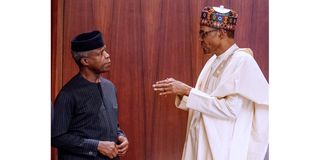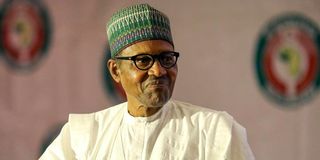Nigeria’s debt at $103b, GDP wanes as inflation, redundancy rise

Nigerian President Buhari (right) and his Vice President Osinbajo. They will leave office on May 29, 2023 bequeathing an economy hit by debt, inflation, unemployment and poverty to their successors. PHOTO | PRESIDENTIAL VILLA
What you need to know:
- A report revealed that Nigeria’s inflation rate will average 20.5 per cent in 2023.
- Data revealed that debtors who owe Nigeria’s government agencies refused to honour obligations but were still being paid.
- Nigeria expected to spend 60 percent of its total revenue on debt servicing in 2023.
Abuja,
Nigeria’s economy is weakening as its total debt climbed to $103.11 billion with spiralling inflation and unemployment.
The dire economic situation is what the country’s outgoing President Muhammadu Buhari would hand over to the incoming president on May 29, 2023.
According to Nigeria’s Debt Management Office (DMO), the total public debt stock of the country consisted of the domestic and external debts of the Federal Government of Nigeria (FGN) and its 36 state governments.
DMO in a statement on its website took a comparative debt stock and reported that Nigeria’s debt as of December 31, 2021 was $95.77 billion. In terms of composition, DMO said the country’s total domestic debt stock stood at $61.42 billion while total external debt stock was $41.69 billion.
“Among the reasons for the increase in total public debt stock were new borrowings by the Nigerian government and its state governments, primarily to finance budget deficits and execute projects. The issuance of promissory notes by the country’s regime to settle some liabilities also contributed to growth in the debt stock,’’ the office said in its latest release in Abuja.

Motorists queue for petrol at a filling station in Nigeria's capital Abuja. Nigerians are in anguish and frustration caused by an acute shortage of petrol and new banknotes. PHOTO | MOHAMMED MOMOH | NMG
However, DMO said that said that ongoing efforts by the government to increase revenue from oil and non-oil sectors through initiatives like the Nigerian Finance Acts and the Strategic Revenue Mobilisation Initiative were expected to support debt sustainability.
‘Debt-to-GDP within limits’
It said that the total debt-to- gross domestic product (GDP) ratio for December 31, 2022 was 23.20 percent, indicating a slight increase from the figure of December 31, 2021 at 22.47 percent.
“The ratio of 23.20 percent is within the 40 percent limit self-imposed by Nigeria and the 55 percent limit recommend by World Bank/International Monetary Fund (IMF). It is also within the 70 percent limit recommend by the Economic Community of West African States (Ecowas),’’ it said.
Nigeria’s total public debt stock as released by DMO excludes the country’s $46.8 billion indebtedness to the Central Bank of Nigeria (CBN), through Ways and Means advances.
The Ways and Means advances are presently awaiting securitisation by Nigeria's National Assembly and can only be added to the country’s public debt after such securitisation.
Sounding an encouraging note, however, it said that Nigeria’s debt-to-GDP was within limits but fell short of espousing its implications to inflation and growing unemployment.
Unemployment to remain unabated
Nigeria’s National Economic Summit Group (NESG) has berated the growing inflationary pressure which remained elevated, driven by structural, cost and monetary factors.
NESG also projected that the country’s unemployment rate will hit 37 percent before the end of 2023.
The group in its 2023 macroeconomic outlook report said the country’s poverty headcount will also rise to 45 percent.
The report said that due to weak performance in the job-elastic sectors, and low labour absorption of sectors that will drive growth, Nigeria’s population growth estimated at 3.2 percent will lead to a decline in real per capita income.
The report also noted that the country’s GDP growth is also expected to moderate to 2.98 percent, as economic growth will be subdued in 2023 due to strains on investment and low productivity in critical sectors.
“The services sector will drive economic growth, but this growth will not be strong enough to generate significant jobs,” the report said.
As a result, it said Nigeria’s unemployment will remain unabated while economic growth will be supported by election-related spending and improvement in the oil sector.

Nigeria’s National Economic Summit Group report projected the country's unemployment rate will hit 37 percent before the end of 2023. PHOTO | SHUTTERSTOCK
The report further revealed that the country’s inflation rate will average 20.5 per cent in 2023.
“Inflationary pressure is expected to remain elevated, driven by structural, cost and monetary factors. Food inflation will remain the fundamental driver of inflation due to the enduring impact of flooding, increased production costs due to increased cost of credit, insecurity and displacement. Existing fuel shortages and the removal of fuel subsidies will continue to increase the core components especially transportation,” it said.
It said that in 2023, Nigeria’s foreign capital inflow will decline saying its trade surplus will be sustained. Albeit lower, its foreign reserve will deplete further, and exchange rate pressure will persist.
Inflation rate increased
According to Nigeria’s National Bureau of Statistics (NBS), inflation rate in January 2023 rose to 21.82 percent compared to December 2022 headline inflation rate which was 21.34 percent.
“Looking at the trend, Nigeria’s January 2023 inflation rate showed an increase of 0.47 percent when compared to December 2022 inflation rate. But on a year-on-year basis, the headline inflation rate was 6.22 percent points higher compared to the rate recorded in January 2022 which was 15.60 percent. This shows that the headline inflation rate increased in the month of January 2023 when compared to the same month in the preceding year,” NBS said.
It also reported that about 133 million Nigerians are multi-dimensionally poor as measured by Nigeria Multidimensional Poverty Index (NMPI) 2022 which indicated that poor people in Nigeria experience over one quarter of all possible deprivations.
“A significant portion of this poor population are deprived of clean cooking fuel, adequate sanitation and access to healthcare,” NBS added.
Nigeria’s Minister of State for Power Goddy Jedy-Agb, restated Buhari’s initiative to lift 100 million Nigerians out of poverty by 2030 through the country’s Energy Transition Plan (ETP).

Outgoing Nigerian President Muhammadu Buhari.
“It will also bring modern energy services to the full population and managing the expected long-term job loss in the oil sector due to global decarbonisation. The plan focuses on the rapid build out of sustainable energy systems to tackle energy poverty in the nation,” the minister said.
Nigeria’s Minister of State for Budget and National Planning Clem Agba also inaugurated the country’s National Poverty Dashboard Situation Room (PDSR) as hub to present veritable tool for a proper understanding of the poverty situation in Nigeria.
The minister said the idea was to have a data hub of poverty and welfare information with different features where policy discussions can be hosted.
Plan to end revenue leakages
Meanwhile, the country’s ministry of finance, budget and national planning has stepped up efforts to block revenue loopholes and debt recovery drive. The director in charge of special projects in the ministry Victor Omata stated that Nigeria’s government debt recovery drive would be driven through Project Lighthouse Programme, initiated by the ministry to put an end to revenue leakages in the country.
According to him, over 5,000 companies and individuals spread across 10 ministries, departments and agencies are owing the Nigeria’s government N5.2 trillion ($1.13 billion).
Omata said that data from the initiative revealed that many companies and individuals who owe government agencies have refused to honour their obligations but were still being paid through the government platforms.
Concerned over the long-time implications of the situation, DMO and the African Centre for Leadership, Strategy and Development (Centre LSD), have tasked the incoming government to show ingenuity in revenue generation to tackle the debt deficit.
The director at portfolio management department of the DMO Dele Afolabi said on March 29, 2023 in Abuja that Nigeria had to be deliberate with revenue generation to harness a balanced economy because currently, the revenue did not match the high debt servicing burden of the country.
He said although Nigeria had the highest GDP in Africa, its government generated revenue to GDP ratio is lower than that of most African countries and this can be tackled through taxes among others.
“Aside from salary earners, some Nigerians are not paying the right taxes. We don’t have the right culture of taxation and revenue for government. So, I think looking at the next government, the key focus should be on how to grow government revenue,” Afolabi said.
Debt servicing
The executive director of Centre LSD Monday Osasah said that the dialogue was imperative following the Nigeria’s government outcry that the country’s debt sustainability had become threatened following the recent rise in its revenue shortfalls.

The Nigerian naira. PHOTO | NMG
Osasah said that Nigeria’s minister of finance is expected to spend 60 percent of its total revenue on debt servicing in 2023 and this portended a grave threat to the economy.
“The burgeoning trend of our debt is worrisome especially when it is now being used for debt servicing rather than for growing and developing our infrastructure,” he said.
Osasah puts Nigeria’s debt service-to-revenue ratio at 83 percent as the third quarter of 2022 and the ratio had been on the rise as the country faced a dwindling revenue while government expenditures have increased.
He said that considering the grim reality, the need to begin to think and commence advocacy for budgetary reforms, fiscal prudence and revenue innovation for the next government was paramount.





